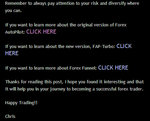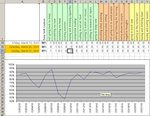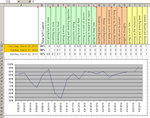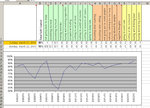famous automated traders and ingenious scamsters
Whether it's noticed or not, many people on the market wizards book are in fact automated traders. I had been wondering why there were no famous automated traders and none on wikipedia, but I was wrong. Indeed there are and they're even all on wikipedia, including the first one of them in a chronological sense (but he wasn't interviewed on market wizards):
http://en.wikipedia.org/wiki/Richard_Donchian
Nonetheless one never notices this, because they're not famous at all. Yes, they're on the most famous trading book there is, market wizards. But few people know and even fewer mentioned their names: Ed Seykota, Larry Hite, Richard Dennis, Richard Donchian. They're mentioned in relation to Market Wizards most of the time. Part of the reason is because, other than on that book, none of them really likes to talk, and appear in the media. But another reason of course is that their big success was prior to internet and now they're a bit older. But they are out there, they're known, and they're all millionaires. And to think that you find people on financial forums who still state that automated trading cannot work because the markets are always changing or because, like that quote by Larry Hite, "everyone would be doing it otherwise".
Now let's see if I can go to the roots of automated trading and find some interesting quotes by Richard Donchian on this concept.
Now I am reading his wikipedia entry and it says he was the father of "trend-following". But if you really think about it trend-following doesn't mean anything. It's a term which is meaningless, and yet everyone uses it. Since you can break time and trading timeframes into inifinte multiples, any trader who'll want to be profitable will want to follow the trend. So all profitable traders will be trend-followers, even top and bottom pickers, because even if you go against the bigger trend, you will definitely be with a smaller one, or else you wouldn't be making any money. Because
trend, simply put, is where price goes, and all traders want to trade according to where price goes. Even if you use support/resistance to trade bounces, you will wait for s/r to be hit and then bet on a reversal, but what you will be following will be a trend, maybe shorter, maybe you won't be late, and maybe you won't even follow it at the start, but
anticipate it, but a few minutes into it, you will be a trend-follower and for the largest portion of that move, you will be following the trend, regardless of whether you anticipated it on all timeframes or not.
Maybe I'm being ignorant, according to the wikipedia entry:
http://en.wikipedia.org/wiki/Trend_following
But I maintain that at least the term is misleading. Even if the concept in that wikipedia entry was reasonable and even if all profitable methods didn't qualify as "trend-following", the term is totally misleading. To me it feels as if there was a trading methodology called "making money", it seems like a redundant term, in that anyone who wants to make money will want to be with the "trend", which is where price is going (whether on a longer or shorter timeframe). But if they tell me that by trend-following we mean longer timeframe, and by that we mean days, then I will still object that the term is misleading because it doesn't incorporate that information. It would be like calling the opening gap method "making money" and omitting "with opening gaps".
So, once and for all, "the trend is your friend", "trend-following" and all things referring to trend are as studid as saying "price is your friend", "price-following". I want to ask these mother ****ers using the word "trend" to stop doing it once and for all, because it deeply upsets me, almost as much as hearing "cool", "dude", "weird", "oh my god".
Now back to looking for what Donchian said about automated trading (also called "system trading" and "mechanical trading").
Didn't find any of his famous articles/letters yet (Ed Seykota says "
About that time, I saw a letter published by Richard Donchian, which implied that a purely mechanical trend-following system could beat the markets"), but I found a good link:
http://ezinearticles.com/?Trend-Fol...The-Best-Two-Systems-to-Begin-With&id=1897004
This is an article by Chris Roberts, saying that the two basic Donchian systems make more money than most systems being sold, and allow beginners to make money right from the start, with a mechanical approach. I believe him, but it's surprising to me, and certainly the parameters to be used with those systems have to be back-tested and set before you can trade them, so that's like saying "use support/resistance", but not telling you how you find those levels and how you trade them. But this guy is a good guy for sure.
On the article it says:
Chris Roberts is a full time mechanical forex trader. He also provides advice to those aspiring to be systems traders. Visit his site for an in depth insight into what he does and the best way for you to get involved in this exciting area:
http://www.profitfromfx.blogspot.com/.
So I am giving up on Donchian for now, and went to his blog, where the last entry says interesting things, because it sounds exactly like what I am doing:
Let me tell you a little about what I do. I am a full time currency trader, who runs various mechanical trading systems alongside each another. I spread risk across around a dozen mechanical systems simultaneously so that I am never too exposed to the failure of any particular system.
I only use 100% mechanical systems, most of which run through the MetaTrader platform in the form of Expert Advisors. I use mechanical trading systems for a number of reasons. Firstly, they eliminate human error. Secondly, they take up much less of your time. Thirdly, they can be backtested over a substantial period of time and various market conditions in order to check their validity.
Right now, I am running 5 systems that I have had made specifically for myself. These are systems that I have designed myself and had programmers build for me. These systems form the lower risk part of my overall strategy, trading over longer time frames and riding long trends. As you can imagine, these have done very well in the conditions we have seen coming into 2009. These systems are generally lower risk but also will never make the outrageous returns that intra-day trades can. They are my "insurance" to make sure that I am still profitable overall.
I am also running 6 systems that I have purchased...
This is where he loses me and yet it's also where I get fascinated by what he says, because he goes on to say (I can't quote the whole thing, but it's
here) that he bought (I never bought or thought of buying any automated systems) FAP and then even FAP TURBO and they work well. This is amazing to me because this guy knows what he's talking about (no scamster would ever start his scam by talking about Richard Donchian, who's meaningless to the public and to scamsters), and yet he's praising applications that I thought were total scams. So I will now read the whole thing, and may write more about this later.
I gotta quote this, because, coming from this fellow automated trader, it's really puzzling and it throws away all my previous ideas about these systems being all scams:
One thing that I have learned about system trading is that every system will have losing trades and losing days, no matter what they may tell you on the sales letter. The thing that you have to achieve is to find one that is a winner in the long term. That is where FAP really stands out from the others. If you look at daily data for the system, it appears to not be any better than any other. It has losing days and sometimes even has losing weeks. However, I have never had a losing month with FAP. Looking at the monthly returns for the system, they are often over 50% and have on occasion gone over 100%. Don't get me wrong, they have been close to zero on occasion, but the fact that they have never been negative is what has really impressed me about this system.
This is very important stuff. One day, if I'll every quit my job and have free time, I will give FAP TURBO a chance, because it wouldn't make sense to not use something that works and that allows me to further diversify my risk. Even if it seems to be a black-box and I'll never know what it's doing, because the objective once again is to make money and not to challenge myself.
Well, well... what do you know... this guy could very well be a scamster. Here's how his post ends:
If you want to learn more about the original version of Forex AutoPilot: CLICK HERE
If you want to learn about the new version, FAP-Turbo: CLICK HERE
If you want to learn more about Forex Funnel: CLICK HERE
Thanks for reading this post, I hope you found it interesting and that it will help you in your journey to becoming a successful forex trader.
Happy Trading!!
Chris
Plus it's the only goddamn article in his blog. Nothing about his family or crap like that. Nothing about other trading experiences... he might be a very smart scamster I guess. Maybe the one who wrote the FAP program.
Ah ah... what an idiot I've been. On the other hand, it's good that I gave him a change and read the whole thing, because it confirmed to me that I was right, and that one should build his own systems all by himself.
Check out the way the "CLICK HERE" characters look (big and everything). He's definitely a scamster:

Then you click on the link, and where does it take you? To a page that looks like this:

Oh man... from Richard Donchian to this crap. Pretty smart indeed. I should have seen it coming when he wrote on the first "Richard Donchian" article (see part I marked in red):
How do these systems compare to those available to buy? Well, to put it simply, it is better than most of the systems out there but perhaps not as good as the one or two that are actually worth buying.
He writes one good article (because he's obviously a trader). Then you like him, trust him, and decide to read his profile, then go to his blog, when there's only one post (and that's alarming), and that one post pretty much resumes what he was saying in the previous article and says "...
buy these two systems that are actually worth buying: CLICK HERE". Pathetic scamster but an ingenious one.
I am intrigued by this ingenious scamster by the name of Chris Roberts and went to check out all his articles:
http://ezinearticles.com/?expert=C_J_Roberts
There's another article which also looks appealing to me and which I am pretty sure now that it will tell me a lot of wise things and then try to push his product in the usual subtle way:
http://ezinearticles.com/?Mechanical-vs-Discretionary-Trading-Systems&id=1898287
I will quote the whole article (since it's short) and mark in red wherever I see the scam:
Mechanical vs Discretionary Trading Systems
All new traders must make the decision to either trade using their discretion, or base their trades on a mechanical system. There are many differences between the two and many reasons why specific people are suited to either one method or the other. This article outlines the difference between the two ways of trading and outlines the personality traits that are suited to each one. By the end, the reader who is new to this material should have some idea whether they would be more suited to discretionary or mechanical trading.
Mechanical trading differs from discretionary in a number of ways. Firstly, it takes all emotions out of trading. This is generally agreed to be a very good thing as emotions are often a great hindrance to traders. Traders often feel inclined to cut their winners too early and to let their losses run into bigger losses, the exact opposite of what they should be doing. By following a mechanical strategy, the trader can enter and exit at points that have been shown to be profitable in the past, thereby eliminating this disadvantage.
Another difference is that mechanical trading takes far less of the trader's time. Once the system is set-up the trader only needs to act when certain criteria are satisfied. He can either set an alert to tell him to act when the rule is satisfied or even better, he can use programming software to instruct the broker to execute the order automatically. Programs such as MetaTrader have become especially popular for this purpose. With discretionary trading, the trader must be in front of his screen as he sees the opportunities develop. Discretionary trading is therefore suited to those who have a lot of time to dedicate to trading and who feel that in order to "earn" any money from trading, they need to "put the hours in".
One other difference between the two is that it is possible to "back-test" mechanical trading systems. This involves quantifying exactly how well the system would have done in the past and it gives a trader the confidence to proceed with the system and expect the same returns in the future. With discretionary trading, there is no way to have such confidence in the profitability of the method. For this reason, discretionary trading is more suited to those who have a high degree of self confidence and a track record of success. However, in actuality, few of us possess this trait and many of us would be better off trading a system that we know has been effective in the past.
This article has identified some of the key differences between the two methods of trading. Whilst there is no right or wrong way, it is my view that too few people set out to be mechanical traders at the start of their journey to profitability. It is an accepted fact that around 90% of novice traders are unprofitable,
this figure would undoubtedly be smaller if more traders began using systems that are proven to work over a period of decades. In addition to this, it would allow new traders to spend less time at the screen and more time analyzing their results and thinking about new strategies.
Chris Roberts is a full time mechanical forex trader.
He also provides advice to those aspiring to be systems traders. Visit his site for an in depth insight into what he does and the best way for you to get involved in this exciting area: http://www.profitfromfx.blogspot.com/.
Ok, so, very reasonably, just as I always do, he explains that mechanical trading is better than discretionary trading. And he couldn't have said it better, because he's probably the author of those automated programs that he'll later try to sell.
And then, sure enough, ignoring that trading is a zero sum game, he tells you that more traders could be profitable if more of them tried the mechanical approach, and I could even agree with this sentence (except of course that if a higher percentage of traders was profitable, these profitable traders would also be less profitable). But then the scam becomes apparent, when he tells you "come to my web site, i am an expert and I will advise you on what's best for you". You go there, and only find one article ("in depth insight", LOL) recommending only 2 systems: FAP Turbo e Forex Funnel. Except that such article - even worse, and here it gets hilarious - says that, of those two systems, one is awesome and the other one sucks (Forex Funnel):
...When I first purchased this EA, it performed well almost instantly. However, it is a little different from the FAP series of products in that it does have losing months. When it does win it tends to win pretty big, but it can have some months in which it loses pretty heavily. This extra variance is not really a good thing, although it is ok as long as you don't mind occasional draw-downs on your account.
I actually moved this system up to a 10% allocation pretty recently after it enjoyed a good period, although it has struggled a little since then. One possible disadvantage of this system is that it only trades on the USD/JPY currency pair. This can leave it a little vulnerable to adverse conditions in this market, whereas the FAP products are suited to all the major pairs.
I do, however, think that the Forex Funnel has a lot of potential. The fact that it is overall a profitable system already puts it ahead of 90% of the other systems available. I think that maybe there could be some work done on the risk management aspect of the system in order to try to reduce some of the losing streaks.
Even though I may move Forex Funnel back down to a smaller share of my fund in the future, this product is generally pretty good and I could recommend it to anyone who has a high tolerance for risk and/or does not feel that Forex AutoPilot is for them. Overall I would give it a generous 4/5. It retails for just under $140, which is a good price, although for just a little more you could get FAP-Turbo, which is probably a better product...
By all means one ingenious scamster.









